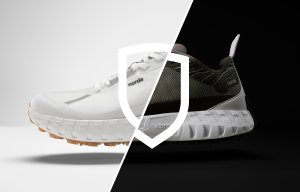
Bio-based first for norda and Dyneema
DSM, producer of Dyneema, has introduced a new fibre designed for the production of ropes that it says provide unrivalled strength, stiffness and durability. DSM says DM 20 is an innovative fibre that completely redefines the capability of HMPE ropes and forms the basis of Dyneema Max Technology.
18th May 2012
Innovation in Textiles
|
The Netherlands
DSM, producer of Dyneema, has introduced a new fibre designed for the production of ropes that it says provide unrivalled strength, stiffness and durability. DSM says DM 20 is an innovative fibre that completely redefines the capability of HMPE ropes and forms the basis of Dyneema Max Technology.
The new technology has been developed for the production of deepwater mooring ropes for oil and gas production facilities but the rigorously tested ropes are said to be ideal for all rope applications requiring resistance to permanent loads.
Deepwater mooring rope specialist Lankhorst Ropes Offshore Division is the first company to use Dyneema Max Technology. The company has developed Gama 98, a new generation of high molecular weight polyethylene (HMPE) mooring ropes suitable for use in permanent deepwater moorings beyond 2000 metres water depth.
“With a significantly smaller diameter than polyester, low creep, high fatigue resistance and weightlessness in water, mooring ropes made with the new DM20 grade from DSM Dyneema offer benefits across planning, system design, logistics, hook-up and installation stages. They guarantee maximum strength over a maximum lifetime, as well as faster handling and improved safety - leading to greater effectiveness and efficiency,” DSM said in a statement.
The Netherlands headquartered company says that as oil and gas developments are moving into ever deeper and more challenging offshore environments, the demand has never been greater for enhanced mooring systems that satisfy the technical parameters of extreme operating conditions. Mooring ropes produced with DM20, are said to now offer assurance in deep water permanent moorings, well beyond the operational life of the installation.
Dr. Fulvio Chimisso, Professor of Mechanical Engineering and Head of POLICAB, Tension Analysis Laboratory of the Rio Grande Federal University in Brazil, has been working with Dyneema products since 2002. His evaluation work is part of a multiyear project sponsored by PETROBRAS, aiming at selecting the best fibre for offshore mooring.
According to DSM, Professor Chimisso has said that: “Dyneema Max Technology has excellent mechanical performance, and its positive buoyancy makes it ideal for offshore work. In addition, as a result of improvements in technology by DSM over the past five/six years, DM20 exhibits much reduced creep in comparison to SK78." Until the introduction of DM20, DSM says, SK78 was the HMPE grade with the best performance on creep, commercially available.
Over ten years ago, DSM and Lankhorst Ropes teamed up to develop technically advanced ropes, and some years later they decided to focus on mooring systems for use in deep water. Working together, the companies initially demonstrated the benefits of HMPE mooring ropes for deepwater Mobile Offshore Drilling Units (MODUs) with SK78. According to DSM, SK78 is currently the only HMPE fibre certified for use in deepwater MODU applications.
More recently, DSM developed DM20, a new grade of fibre that it says has the strength and flexibility required for the production of rope capable of enhanced performance in permanent deepwater and ultra-deepwater moorings. Subsequently, Lankhorst translated those properties into what DSM describes as ‘possibly the strongest deepwater synthetic rope construction in the world’ - Gama 98, incorporating Dyneema Max Technology.
DSM's Segment Manager Offshore, Jorn Boesten explains that the new rope is not only stronger than polyester and steel alternatives, but lighter and easier to install: "Ropes made with DM20 will enable smaller vessels to transport and install mooring systems far quicker and safer than ever before. The new rope also offers more freedom at the riser design stage of production facilities, as well as a host of other operational benefits."
Lankhorst Euronete Ropes' Sales Director, Chris Johnson, explains that during the development process, both DSM and Lankhorst used their individual testing facilities to evaluate the tensile strength, fatigue and breaking strength of both the fibres and rope constructions: "By sharing test results we were able to complete the development of the new rope much more quickly and efficiently."

Business intelligence for the fibre, textiles and apparel industries: technologies, innovations, markets, investments, trade policy, sourcing, strategy...
Find out more